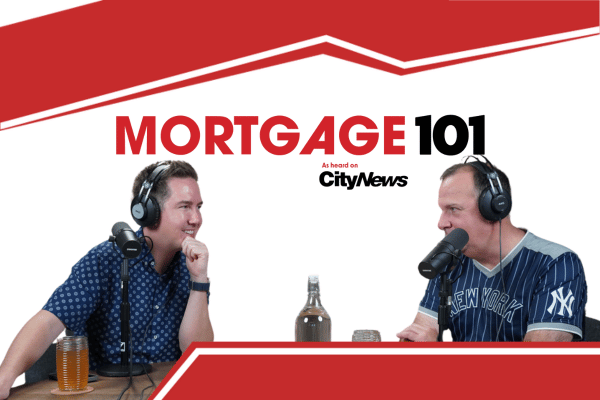Blair Patterson joins your Mortgage 101 hosts once again to continue the conversation of pride in homeownership for Pride Month in Halifax! The three of them emphasize the need for support and resources to help members of the queer community fulfill their dream of homeownership.
Mortgage 101 – why more borrowers are doing refinances | July 2022 Part 4
In this episode of Mortgage 101 with Clinton Wilkins and Todd Veinotte, as heard on CityNews 95.7 and CityNews 101.1, the guys talk about why more borrowers are doing refinances right now. You’ll find out everything you need to know about using a refinance for a renovation — and how home owners need to focus on the “envelope” of their home — and how a refinance can help you protect your real estate investment.
Mortgage 101 with Clinton Wilkins & Todd Veinotte: There’s so much going on in mortgage lending right now
Don’t feel like watching the video? Check out the transcript below.
Transcript:
Why more borrowers are doing refinances
Todd Veinotte: [00:00:00:03] So you want to talk about refinance, right?
Clinton Wilkins: [00:00:02:03] I want to talk about refinance because it’s really come even more on the forefront lately, Todd. And I’ll kind of tell you why that is. And, you know, it may even speak to the first kind of segment that we did. We were talking about the Bank of Canada. We were talking about inflation. A lot of clients are refinancing to better their financial position right now.
Todd Veinotte: [00:00:23:05] Right.
Clinton Wilkins: [00:00:23:20] And, you know, people do refinances all the time to clean up debts and all this stuff. Like, yeah, that’s normal. But some people are doing it to be planful and taking control of their finances.
Todd Veinotte: [00:00:33:21] Proactive.
Clinton Wilkins: [00:00:34:10] Proactively! And some of it’s mid term, Todd. You know, some of it’s mid term, some of it is, you know, at renewal. But what people are doing, a lot of borrowers are extending their amortisation.
So I have a lot of borrowers who have like 10 years left, 12 years left, 16 years left, 20 years left. And they’re pushing back to a 25 or a 30 year amortisation to bring down their borrowing costs. Not forever, Todd. Temporarily until some of this inflation gets under control. Some consumers, obviously, you know, we’re all feeling the pinch.
You know, we’re feeling the pinch at the pumps. We’re feeling the pinch at the grocery store. And they’re extending their amortisation to bring down their mortgage payment. Obviously, it’s going to bring, it may keep their interest carrying costs as they might increase their interest carrying costs, but they’re increasing their amortisation to bring down the amount of principal that they’re paying.
And it’s going to reduce their monthly output and leave more money in their bank account to deal with, you know, the consumer goods that are, you know, obviously more expensive now than they were before.
More Canadians are becoming financially literate
Todd Veinotte: [00:01:38:03] This is something that at one point people didn’t look at as, I guess it was always an option, but it was considered a step back.
Clinton Wilkins: [00:01:46:26] Taboo.
Todd Veinotte: [00:01:47:07] Right. Maybe it would have been a step backwards, right? So why do you think that we’ve had that shift?
Clinton Wilkins: [00:01:51:12] Because I think people are becoming more financially literate, Todd. You know, obviously we’ve talked about this a lot in our show and financial literacy is huge. But I think people are worried. You know, they’re seeing how quickly inflation really got out of control and dealing with something with their mortgage is something within their control. And I think it’s really very savvy and smart consumers that I’m having these conversations with. Very educated people.
I’m talking about like doctors and lawyers and things like that. And you think, “Oh yeah, these guys have all kinds of money and you know, you know, inflation is not going to impact them.” It impacts everybody. You know, it doesn’t matter what your annual income is. Inflation is impacting everyone. And some people are doing this as really a part of their financial plan and they say, “hey, Clinton, I’m going to do this for five years. And you know what? If inflation gets under control, I’m going to do a payment increase or I’m going to do a lump sum payment.”
Some other consumers that we’re having conversations with when they see what’s going on with the interest rates and obviously the Bank of Canada, some borrowers are choosing to do a payment increase. They’re like, “okay, the cost of interest is going up, I’m going to increase my payment. I’m going to double down with the effort to pay down the debt a little bit faster now than I did before.” So there’s kind of two schools of thought, but I think it’s certainly a really important time right now, Todd, to look at your whole finances and see really what’s going on.
Don’t neglect the need-to-do renovations
Todd Veinotte: [00:03:22:19] It’s important, I think, that when people are going to take equity out of their house, if they have some urgent needs, infrastructurally with their house, they also take care of that.
Clinton Wilkins: [00:03:34:03] Oh, that’s a priority.
Todd Veinotte: [00:03:35:23] Because you can pay off debt, you can do it. But if you’ve got a bad roof or if you’ve got leaking this or you’ve got a bad furnace, you have to protect that asset.
Clinton Wilkins: [00:03:44:08] Yeah, exactly. And if you don’t have the asset protected.
Todd Veinotte: [00:03:46:18] Right, what’s the point?
Clinton Wilkins: [00:03:47:18] It’s really going to go down in value. Now, I think you mentioned to me that you might have a bit of a story.
Todd Veinotte: [00:03:53:03] I do. Well, I’m looking at the picture.
Clinton Wilkins: [00:03:55:12] I’m looking at a photo. Well, that looks like a very nice chimney.
Todd Veinotte: [00:03:57:27] That’s a nice chimney. Right.
Clinton Wilkins: [00:03:58:29] I’m guessing that this might be new.
Todd Veinotte: [00:04:00:08] Is that that’s new. That costs me about $2,600 bucks.
Clinton Wilkins: [00:04:02:24] Wow. Okay.
Todd Veinotte: [00:04:03:14] Right. But the point is, I guess what I’m getting at is that is not a sexy upgrade to my house, right? I don’t it.
Clinton Wilkins: [00:04:09:21] You don’t even really see it. You park your car out in front of the house and go in.
Todd Veinotte: [00:04:13:21] So I could have spent the 24 on whatever aesthetically. But I guess.
Clinton Wilkins: [00:04:17:15] You could add a new stove or a new fridge.
Todd Veinotte: [00:04:19:10] Exactly. So I guess my point is, is that that people need to in my opinion, you’re the expert. So I want you to weigh in on this. And I’m sure you have these conversations with people. Take care of the stuff that needs to be taken care of.
Clinton Wilkins: [00:04:30:12] Even if it’s not sexy.
Todd Veinotte: [00:04:31:16] Right. The shiny stuff will come after that.
Why do people not focus on the “envelope” of their home?
Clinton Wilkins: [00:04:34:02] You know, I think foundation is huge. I think roof is huge. And what we call that is the envelope of your home.
Todd Veinotte: [00:04:42:02] Right.
Clinton Wilkins: [00:04:42:14] And if the envelope isn’t good, you know, you’re just putting lipstick on a pig, really otherwise. And I think, you know, roof is really, really important. And sometimes people neglect these things.
Todd Veinotte: [00:04:54:04] Do you think they just don’t know or what?
Clinton Wilkins: [00:04:55:21] You know what? That’s more of a maintenance issue than maybe a capital improvement. You know, that’s not maybe something that’s going to give you a return on investment, Todd. But guess what? That is something that’s going to protect your investment.
So I think when you’re doing a refinance, thinking about things like that, I think consumer debt is huge. I think having a conversation about the amortisation is very, very important and what improvements can protect your investment, but also improve your investment because you’ve done a lot of work at your house.
Todd Veinotte: [00:05:23:19] I’ve done a lot of work and it’s all just been a result of the work that you’ve done with me. I paid off some debt. I’m completely debt free now except for a car loan in my mortgage. And I’ve had,
Refinance bottom line: Protect your investment
Clinton Wilkins: [00:05:35:17] You’re always going to have car loan.
Todd Veinotte: [00:05:36:19] And always have a car loan. And I have, and I’m putting the money back into the house and it’s amazing.
Clinton Wilkins: [00:05:42:22] I would be very curious to see, because we know how much your home is worth. Obviously, it went up significantly since you bought it. I’m interested to see now that you’ve done some of these renovations, how much of that house is worth. Because I bet you’ve increased the value of your home, probably $2 for every dollar you put in.
Todd Veinotte: [00:05:59:08] Exactly. That’s right.
Clinton Wilkins: [00:06:00:13] Which is pretty exciting.
Todd Veinotte: [00:06:01:02] It is. So I’m not saying this stuff to brag or whatever. I’m saying that.
Clinton Wilkins: [00:06:05:24] Well, you know, a lot of our listeners are homeowners, you know what I mean? So, you know, this is just like the real life. You know, I bought and sold and traded, like, so many properties, Todd.
Like over the years and a lot have been really, really good investments and I’ve made money. The thing is, when it’s your principal residence, if you live in it long enough, there’s no capital gains. It’s a really good investment. And often in cases, this home is a family’s biggest asset. And, you know, it’s your biggest asset.
Todd Veinotte: [00:06:35:01] Absolutely,
Save your money and stick to a budget
Clinton Wilkins: [00:06:35:28] You know, obviously, the mortgage is your biggest debt. And that’s really what you’re focusing on paying down. But, you know, if you don’t get into that property ladder, you know, it’s really hard. You know, I think in general, like Canadians aren’t great savers, you know, I think.
Todd Veinotte: [00:06:51:04] Who can be now with the way,
Clinton Wilkins: [00:06:52:16] I know. You know, I think they were a little bit better over COVID because, you know, they weren’t going out, they weren’t shopping, they weren’t vacationing. But now with this flood of money into the marketplace, that’s what’s really increased inflation. And just to circle back and touch on the Bank of Canada, they really did give a clear message for Canadians to stop spending. But when you’re spending on something like your home and you’re improving that asset, I think that’s a good investment.
Todd Veinotte: [00:07:19:14] Yeah.
Clinton Wilkins: [00:07:20:02] And like you, the money that you spent was really good and planned out, you know what I mean? I think sometimes when people do renovations, they want to do some of the nice to do things.
And I think the needs to do are certainly number one. Yeah, nice to do number two. But you need to work within the budget and as we know, with inflation, things are more expensive and you really need to know what your budget is and work within that.
Todd Veinotte: [00:07:44:18] Should people potentially, because inflation is high, take some of that money and stay there and perhaps wait it out, see if prices will come down. Contractor availability might be better in a year from now or whatever. If something’s not, you don’t have to spend the money, I guess, is what I’m saying?
Clinton Wilkins: [00:08:00:02] Yeah. I mean, maybe putting the money away, it can be a good thing. But what is the future value of money? Is it going to be more expensive in a year? I don’t know. I think the other thing is, I have so many clients and it just kind of like I want to shake them sometimes. Sometimes they improve the property and then they sell it.
Todd Veinotte: [00:08:19:05] Yeah.
Clinton Wilkins: [00:08:19:25] Why not have this property improved and enjoy it while you own it and while you live in the property? So that’s sometimes this drives me insane because I see these people and they’re like, “you know what? I worked all my life to pay down this mortgage. Now I want to do a refinance. I’m going to pull some equity out. I’m going to renovate it, then I’m selling it.”
But why not have done that five years ago or ten years ago and enjoyed it and had your property kind of appreciate? Because, you know, I think there’s a balance between paying down the debt and having a quality of life. And I think that’s a hard balance. And it’s hard to always find that balance. And I think it’s really hard to find that balance right now. And I think that’s why we’re seeing some consumers going with longer amortisation.
Condo refinances and renovations
Todd Veinotte: [00:09:03:01] Here’s a quick question for you. If you own a condo or are there any, does that make it more problematic at all to refinance?
Clinton Wilkins: [00:09:09:15] It depends.
Todd Veinotte: [00:09:11:13] A lot of the work gets done by the condo board.
Clinton Wilkins: [00:09:13:26] Yeah. So it depends on the square footage of the condo. That’s kind of the big thing. If it’s a micro condo, not every lender will entertain a refinance. But if it’s a, you know, a decent size, you know, if you have like a two bedroom, two bath condo type situation, usually it’s no problem.
We refinance condos all the time. If you’re doing any renovations within the condo, though, Todd, you may need the approval from the condo Corp. even if it is in within your four walls, because there’s things like debris and noise and you need to have special approval to do those type of things.
Semi detached home refinances and renovations
Todd Veinotte: [00:09:47:27] So duplex, same thing, I guess? You’ve got infrastructure shared wall, shared roof.
Clinton Wilkins: [00:09:53:06] You know, you don’t necessarily need approval from your neighbour, you know, I think it’s probably the neighbourly thing to do. I certainly have seen a lot of duplexes where, you know, one’s white and one is grey and you know, it looks a little bit strange and it doesn’t really match up. It’s the same thing. Like when you have a shared roof, it’s like it looks kind of weird when there’s two different colours, like get together and do it all.
Todd Veinotte: [00:10:12:23] And it’s not the right way to do it anyway.
Clinton Wilkins: [00:10:14:08] No, exactly. It’s, always better if you are really probably close with your neighbours, if it is a semi-detached home. Certainly there are a lot of semi-detached and townhomes here in Nova Scotia and Halifax. So, you know, we do see this quite a lot.
Refinance 101: What you need to prepare
Todd Veinotte: [00:10:30:15] Yeah. So what advice do you give people when they’re going to do a refinance? There’s a lot of things that they should get and can get in order to speed up the process.
Clinton Wilkins: [00:10:38:29] Well, I think having your income documents together really, really important. You know, if you’re employed by an employer and they’re taking deductions at source, we typically will ask for a pay stub in your last two years a T4s just to see kind of where your income is. You know, if you’re self employed, we typically ask for two years of your tax returns. You know, there’s lots of solutions for different scenarios, but that’s kind of like the general stuff that we’d ask for.
We would also ask for last year’s mortgage statement and your current property tax bill. So those are kind of the initial documents that we would get. We’d love to look at what the property value is, so how much the property would sell for today in this market. And I know James talked about that the average house price in Halifax is around $500,000. You typically know how much your home is worth.
You’re watching your neighbours and you see kind of the homes that are selling. So have an idea about the market value. And then have an idea about what you want to do. You know how much you owe. We can certainly look at the liabilities and make a recommendation, but have a rough budget. And I always tell people if you’re doing renovations, go with the high end of the budget.
I talked to a customer today. They’re like, “I’m we’re not sure if we’re doing a $15,000 renovation or $25,000 renovation.” I’m like, ‘this is really easy. We’re going to get you $25,000. And if there’s extra money left over at the end, we are going to do a lump sum payment back down onto your mortgage.” It’s always better to have more than have less, because what happens when you have less? You’re borrowing it on a lot of credit. Or maybe a more higher cost credit facility, like a credit card or a loan or something like that. So that’s certainly something to think about.
If you have any questions, get in touch with us at Clinton Wilkins Mortgage Team! You can call us at (902) 482-2770 or contact us here.


